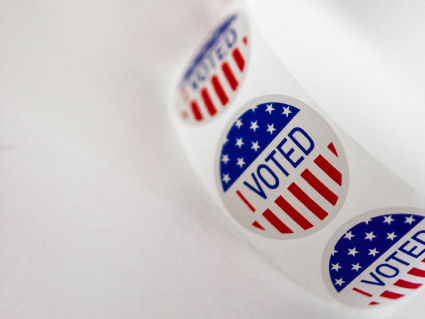McGrath: They Don’t Want You to Vote — Go Anyways

(Courtesy Element 5)
August 27, 2020
As election day nears, many fear how voting will be impacted during a pandemic, especially when our own president is attacking a federal system that we use to deliver and receive mail-in ballots. I never thought we would have to defend and protest to save the postal service, but now our votes depend on it. Vote-by-mail lowers the barrier for participation and can contribute to higher voter turnout than ever before, especially for young voters. Young Americans need to see that Trump’s behind-the-scenes strategies to cut funding to the USPS and decrease trust in mail-in voting is a direct voter suppression tactic. Regardless of your political affiliation, this assault on voting and democracy should push every college student to exercise their civic rights and vote this fall.
Trump appointed his mega-donor, Louis DeJoy this May as the postmaster general. He has donated more than $2.5 million to Republican state parties and candidates since 2016. With his new appointment, DeJoy called for mail carriers and clerks to not receive overtime, which is necessary to complete large deliveries on time. He also told employees to “leave mail behind at distribution centers if it delayed letter carriers from their routes.” The president of the Salt Lake Area American Postal Workers Union is “seeing mail left behind in processing centers, rather than being delivered.” The effects of these new policies are already affecting our local mailing centers and processes.
DeJoy’s policies are the direct cause of slower delivery times and disrupting Americans’ mail — which should raise alarm bells for Utahns since we have a universal vote-by-mail system. After criticism of the new processes, DeJoy made a public statement attempting to gain Americans’ trust by “avoiding even the appearance of [making] any impact on election mail.” He then instructed maintenance managers to not reconnect or reinstall any mail sorting machines they have disconnected. USPS also removed public letter collection mailboxes and sorting machines with no intention to reinstall them until the election is over.
Not only did Trump appoint a donor who has been crucial to his campaign, but he’s also opposing funding for the USPS to handle a large amount of mail needed for the 2020 election process. “Now, they need that money in order to make the post office work, so it can take all of these millions and millions of ballots,” Trump mentions in a Fox News interview, “Now if we don’t make a deal, that means they don’t get the money. That means they can’t have universal mail-in voting, they just can’t have it.” Blatant, strategic decisions are being made to disrupt voting. Trump wants to decrease trust in mail-in voting — by claiming it will lead to voter fraud. When in reality, the chances of fraudulent votes near to nothing — sometimes as little as .0025 percent — being too small to make a statistical difference.
Despite all the corruption and confusion, Trump’s antics shouldn’t dissuade us from participation. If anything, it should tell us just how much it matters that we participate. In 2016, 90 percent of young Americans between the age of 18-29 reported interest in politics, yet only 43 percent of them voted. Young voters have a history of not voting and consistently have a lower turnout. Despite this trend, newer generations can have enough “electoral clout” to have a large impact in comparison to older voters in November.
In recent weeks, people have argued that the DNC’s speaking line-up indicated a lack of care about young voters. There’s a reason why the speakers seem “tailored to appeal to older Americans and longtime voters” — many of the deciding votes in the upcoming elections are likely to be from older voters. As a young voter, I hear constant complaints that politicians are “out of touch” with our wants, but it’s important to notice that most politicians aren’t out of touch with the people who vote them into office. They don’t have to relate or be in touch with us because they can trust that we’re won’t show up to the polls.
If young Americans voted at the same rates of older citizens, democracy would see a revolutionary change. We would see politicians fight issues young citizens worry about. Elected officials would represent younger generations. Politicians would have to answer to a more balanced demographic of young and old voters. It would become impossible for them to keep power unless they listened to us.
Voting isn’t easy, and it isn’t a coincidence. Adding obstacles to an already difficult process is one of the key tactics of voter suppression. But there are ways we can get around the barriers they’ve set up. We can still register to vote. Utahns can still vote early and in-person this November. New voters can request their mail-in ballots early, and we can all send our ballots at least seven days before election day.
If your vote didn’t matter so much, they wouldn’t be trying so hard to keep you from using it.






